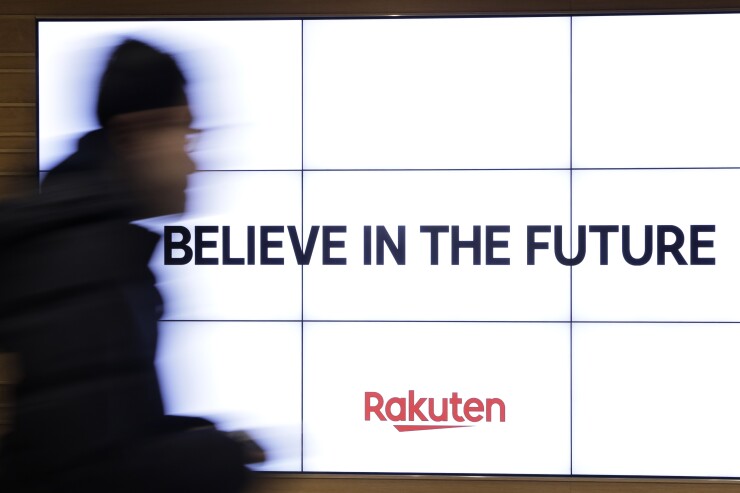The Tokyo e-commerce provider Rakuten is the latest fintech to get in line for a U.S. banking charter.
The company, which in the U.S. operates a shopper rewards program, said it plans to file applications on Friday with the Federal Deposit Insurance Corp. and the state of Utah for an industrial loan company charter.
Rakuten, which is also known for online banking and credit card services in Asia, has built a membership program through affiliates such as Ebates, which it acquired in 2014. Its roughly 13 million active users earn cash-back rewards for buying goods from participating merchants.
Rakuten’s U.S. bank would be based in Utah and would hold its shoppers’ deposits, said Lee Carter, the firm’s head of banking development and would-be chief executive of the ILC. The company also plans to offer its members a credit card to make future purchases as another way to earn cash-back rewards.

“We want to have a fair opportunity to serve our clients,” Carter said in an interview. “And we want the opportunity to provide additional financial services to them.”
Yet in its pursuit of a charter, Rakuten joins a growing list of fintechs seeking successful entry into the regulated banking sector that have all faced their share of obstacles. The ILC, especially, has been fraught with controversy since Walmart's unsuccessful attempt to obtain a charter before the financial crisis gave way to a freeze in new approvals.
ILCs enjoy an FDIC guarantee on their deposits while avoiding banking holding company requirements, meaning a firm with retail operations can still own one. Yet community banks and other critics call the charter a regulatory loophole. They have been particularly opposed to companies with nonfinancial businesses gaining entry, saying it would cross a traditional line separating banking and commerce.
The latest fintech applicant seeking an ILC before Rakuten was the payments giant Square, which resubmitted an application in December after having previously withdrawn its bid.
The Square application is considered a bellwether for other companies weighing whether to apply. Experts have said that fintechs
Carter, who joined Rakuten from UBS’s Utah-based industrial banking operation almost one year ago, said the e-commerce company has "kept a close eye on Square’s application.”
Consumer advocacy groups have
Carter said the company has not yet met with these groups because of the confidential nature of the ILC application process. He added that Rakuten will be providing a “full-blown strategic CRA plan” alongside its application.
“We have thought about that very, very carefully,” Carter said. “We’ll have specific goals for community service and investments back into the community.”
Rakuten operates separate banking operations in Japan and Luxembourg that would be kept apart from the U.S. unit, and about 40% of Rakuten’s revenues come from financial services, Carter said.
Rakuten does not have immediate plans on the payments side. Yet Carter said the company did note in its application with the FDIC that it has “aspirations” to make acquisitions in the payments space starting in the second year of operation should its charter be granted.
The ILC is only one option on the table for tech-focused companies seeking a bank charter. Firms such as
Meanwhile, the OCC has also made available a new special-purpose charter tailored to fintech firms, but those efforts has been challenged in court by state regulators and no company has yet to apply.





